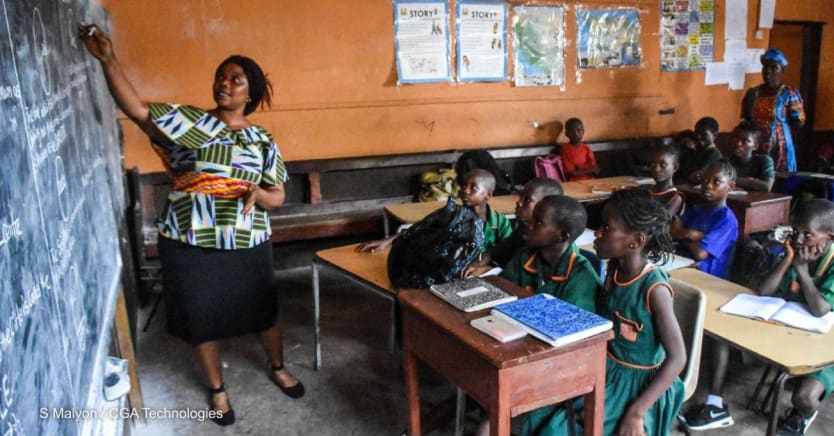
Restoring funding for support to women and girls was the most positive point of the U.K. government’s Strategy for International Development released two weeks ago — especially once Liz Truss, the U.K. secretary of state for foreign, commonwealth, and development affairs, confirmed that funding is being restored to 2019-2020 levels, consistent with the 0.7% target.
U.K. aid’s systematic focus on women and girls is likely to be one of the more durable bits of the strategy. It set out an overtly clear “three E’s” framework: to educate girls, empower women and girls, and end gender-based violence.
But many taps have been turned off since 2020: programs killed, even at the point of contract, such as Investing in Adolescent Girls Rwanda; cut, such as Girls’ Education South Sudan 2; or deferred — Leh Wi Lan Sierra Leone’s successor. Not only is the need great and growing, U.K. aid has to deliver from a standing, if not retrograde, start. And it’s fantasy to think funding multilaterals, with their long procurement timelines, would be quicker.
Fortunately, there are ways to achieve great impact right now with regard to educating girls, empowering women and girls, and ending gender-based violence. Here we focus on the first — educating girls — because it also does much for the second and third, and because CGA Technologies can speak from experience.
From notional ‘leaving no one behind’ to systematic ‘bringing everyone forward’
There is unfinished business on access to primary education in fragile states, and for the multiply marginalized across Africa. U.K. aid is uniquely well placed to systematically “finish the job.”
For fragile and conflict-affected states, we know that wide coverage, ultra-low cash transfers can be transformative for enrollment and retention.
In South Sudan, girls’ enrollment quadrupled in seven years thanks to U.K. aid-funded cash transfers of just $20 per year. Still, an estimated 2.8 million children remain out of school, and at least half of those are girls. The systems to remedy this are in place: restore funds cut from GESS2 and top them up; don’t wait until girls are 10 years old to help; and provide bigger cash transfers to retain them in secondary.
Individual student data is the foundation, as we’ve seen with Link Education in Malawi with the Girls’ Education Challenge-funded TEAMGirl program. With it, cash can be used quickly to keep multiply marginalized girls in school — whether the reason is disability, having lost parents, living in deep rural places, or expecting or having a child.
Family poverty and protection issues such as domestic violence correlate — as, sadly, schools in the U.K. are seeing at the moment. Cash to girls and their families empowers girls and women, especially when it comes directly to their phone, and the evidence shows it is a key tool in supporting them to receive an education.
Where the data systems for individual students and their families are in place, as in Sierra Leone — with the national rollout of the education attendance management system and the national education management information system reports — and soon in Uganda, hooking them up with mobile money payments and getting cash out to them this academic year is pivotal
Even with cash, you can’t just “build it and they will come.” Sierra Leone Education Minister David Sengeh’s 2021 “Radical Inclusion” policy set this out. The Radical Inclusion Implementation Plan and forthcoming Out of School Children Strategy set out an approach to systematically follow up and open up school for those who are vulnerably housed or homeless, and to join up with social protection and child protection systems.
Digital content and support: Getting materials and support in girls’ hands
The aspiration for at least “12 years of quality education” is not a dial you can move quickly by conventional teacher-training and accompaniment means — or by printing and shipping books.
Now that the COVID-19 “Tech4ED” hype is over, pragmatic and rapid progress can be made by using digital means to distribute content and complement teaching.
First, make sure everyone has a copy of the materials. The quickest way is, like South Sudan’s Ministry of Education did in 2021, to make the PDF files available for free and push them out on WhatsApp — so every village has a copy of the textbooks on someone’s phone.
Second, make the most of the wonderful digital educational resources available: is there a reason why BBC Bitesize materials need to be immobilized at the White Cliffs of Dover?
In both cases, new materials aren’t necessarily needed. It’s just a matter of joining up content and distribution to get national-scale impact at uniquely-low marginal costs.
Lastly, practical digital support. We work with St. Paul’s School in London, EasyA — a tech company, Kusuma Trust, and schools in Juba, South Sudan, to roll out Colet Mentoring, a live near-peer mentoring app, which has been a big part of U.K. schools’ COVID-19 resilience. Students in Juba who hit a problem on their homework take a photo, upload it to the app, and get help on demand on the chat from A-level pupils from St. Paul’s. CAMFED’s “learner guides” work in a similar way.
Good, cheap, and quick
All these approaches are, deliberately, almost instantly deployable — in both technical terms and practically for the Foreign, Commonwealth & Development Office, because they work within previously approved business cases, contracts that can be “reflated,” and simple accountable grants. All of which is important both for impact for girls and women and to deliver visible results that rebuild the political and public case for aid.
Update, June 28, 2022: This article has been updated to reflect the statistics of girls who are out of school in South Sudan and to clarify reference to the U.K.’s official development assistance.
Corus International is a global family of changemakers that envisions a healthy world forever flourishing in dignity and justice. As part of the Corus ensemble, learn more about CGA Technologies' work to educate girls through affordable, scalable and effective digital solutions.









